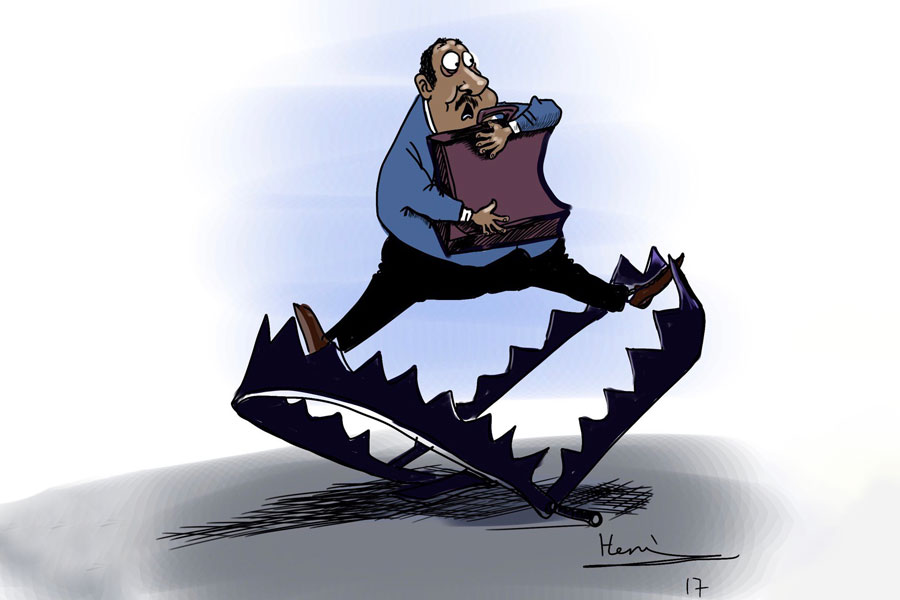
In-Picture | Aug 03,2025
Aug 29 , 2020
By Christian Tesfaye
A political party consultation was held at the UN Economic Commission for Africa's (ECA) hall for national consensus. The most controversial statements came from Merera Gudina's (Prof.) presentation on nation-building and the opportunities and challenges thereof. It offered an interesting reading of modern Ethiopian history, delivered with confidence and taking on subject matters unlikely to have made everyone happy. There only seemed to be one problem.
What happened to all of the class politics, its legacy and its contribution to the current political dispensation? Was it just really a temporary blip in the behemoth that is identity politics when it comes to Ethiopia’s political history? Was class analysis really only necessary in Ethiopia’s past, to understand power relations between the various languages and cultures of different groups and nothing more?
Yes. To understand why class has had, and will continue to have, very little impact on the political discourse and will not be used as a successful means of political organisation, it is essential to look at how Karl Marx understood it.
Ironically, Marx would have rejected identity politics. In his reading of history, the masses have been long divided by social categories and nationalities. They have had what is known as "false consciousness," as opposed to class consciousness. This means that the masses will be barking at the wrong tree until their interests are aligned with their economic class. This effectively rules out identity-based politics by Marxian standards as the correct means of organising the masses.
Communist revolutions are final - marking the endpoint of history - because these will only happen when the masses, the proletariat, align with their class interests and will consciously organise and establish institutions along these lines, Marx theorised. All other revolutions will only have temporary outcomes, because the masses will not have identified what is at the root of their exploitation - the lack of control over the means of production.
“The totality of these relations of production constitutes the economic structure of society, the real foundation, on which arises a legal and political superstructure, and to which correspond definite forms of social consciousness,” Marx wrote in "A Contribution to the Critique of Political Economy," articulating economic determinism.
Identity politics aims for the superstructure. It can influence the so-called "Base," but economic structures are still the real foundation.
Here, people familiar with Marx’s theory would point out one crucial factor. The workers’ alignment of interest with their class was supposed to come on the eve of the communist revolution which, according to Marx, would only happen once capitalism has reached its late stage.
They would be right. That is how Marx saw history playing out. When the Student Movement broke out in the late 1960s, Ethiopia was a peasant society. Feudalism was still the name of the game. No wonder the masses identified with their lingo-cultural groups and showed little, if any, display of class interests.
In fact, Ethiopia is still an agriculture-based economy – if we go by the amount of employment. It should thus be in the future - as we are fully wedded with capitalism, and the mass of the workforce finds itself working in industry and is urbanised - that class politics take its rightful place, according to Marx’s analysis.
But this assumed one big element Communism failed to consider, psychological behaviour does not leave much space for class identification. The hole it created was later addressed by Communist regimes facing peasant-based societies – from Ethiopia to Russia to China - in a contradictory manner. Since the masses have yet to recognise their real interests, and could never hope to fight against systems organised by elites, a vanguard movement needed to be created to bring about the dictatorship of the proletariat – in essence, the establishment of a one party-state.
Vanguardism was an answer to Marx's failure to recognise that people are not by nature wholly preoccupied with their economic place in society. We are social creatures to whom language is more than a means of communication; culture is more than a lifestyle choice; and religion is more than a tool for answering what happens after death.
These three things are part of what form our identity. Without them, most of us, or perhaps even all of us, are incapable of identifying our place in the universe. And the greater heterogeneity of the society we find ourselves in, the more critical these elements become to forming our identity. This is true for any country, and it is also true for Ethiopia.
The best means of illuminating this is perhaps the experience of the United States. One popular hopeful that wanted to ride the class consciousness wave as economic inequality worsens in the country was Bernie Sanders, US presidential candidate this year and in 2016.
His positions on healthcare, labour rights and international trade agreements, all of which focused on the challenges of low-income and middle-class Americans, should have won him their support across the board. But, no. The United States is a heterogeneous society. Black Americans and poor white working-class Americans did not look past their socio-cultural identity, create alliances alongside their class interests and put him in the White House.
African Americans vote for the party – or the typical Democrat, Joe Biden - that vows to acknowledge their historical marginalisation and swears by cultural diversity, although the Democratic Party’s record on realising a more equitable distribution of wealth is questionable. White working-class Americans, by and large, voted for the Republican Party, which has long vowed to cut taxes for the rich and stop the expansion of healthcare coverage. It is not about class. Some overlap may occur, but it is about identity mainly.
Ethiopia is no different. Finding a moderate way of conducting identity politics is all we can hope for. Class politics is fantasy. Do not simply take my word for it.
Take the major political players of the latter half of the 20th century. Two – Ethiopian Peoples Revolutionary Party (EPRP) and All-Ethiopia Socialist Movement (MEISON) – centred their movements on class struggle. Three - Tigray People’s Liberation Front (TPLF), Oromo Liberation Front (OLF) and the Eritrean People’s Liberation Front (EPLF) - made identity politics their central theme.
Now, tell me, which ones are relevant to Ethiopia’s politics today?
PUBLISHED ON
Aug 29,2020 [ VOL
21 , NO
1061]


In-Picture | Aug 03,2025

Agenda | Feb 22,2020

Sunday with Eden | Oct 11,2025

Fortune News | Aug 13,2022

Editorial | Oct 20,2024

Commentaries | Sep 21, 2024

Sunday with Eden | Aug 16,2020

Editorial | Aug 07,2021

Viewpoints | Nov 21,2020

Fortune News | Jan 22,2022

Photo Gallery | 174949 Views | May 06,2019

Photo Gallery | 165176 Views | Apr 26,2019

Photo Gallery | 155445 Views | Oct 06,2021

My Opinion | 136748 Views | Aug 14,2021

Dec 22 , 2024 . By TIZITA SHEWAFERAW
Charged with transforming colossal state-owned enterprises into modern and competitiv...

Aug 18 , 2024 . By AKSAH ITALO
Although predictable Yonas Zerihun's job in the ride-hailing service is not immune to...

Jul 28 , 2024 . By TIZITA SHEWAFERAW
Unhabitual, perhaps too many, Samuel Gebreyohannes, 38, used to occasionally enjoy a couple of beers at breakfast. However, he recently swit...

Jul 13 , 2024 . By AKSAH ITALO
Investors who rely on tractors, trucks, and field vehicles for commuting, transporting commodities, and f...

Oct 18 , 2025
The political establishment, notably the ruling party and its top brass, has become p...

Oct 11 , 2025
Ladislas Farago, a roving Associated Press (AP) correspondent, arrived in Ethiopia in...

Oct 4 , 2025
Eyob Tekalegn (PhD) had been in the Governor's chair for only weeks when, on Septembe...

Sep 27 , 2025
Four years into an experiment with “shock therapy” in education, the national moo...

Oct 18 , 2025 . By NAHOM AYELE
In a sweeping reform that upends nearly a decade of uniform health insurance contribu...

Oct 18 , 2025 . By BEZAWIT HULUAGER
A bill that could transform the nutritional state sits in a limbo, even as the countr...

Oct 18 , 2025 . By SURAFEL MULUGETA
A long-planned directive to curb carbon emissions from fossil-fuel-powered vehicles h...

Oct 18 , 2025 . By BEZAWIT HULUAGER
Transaction advisors working with companies that hold over a quarter of a billion Bir...